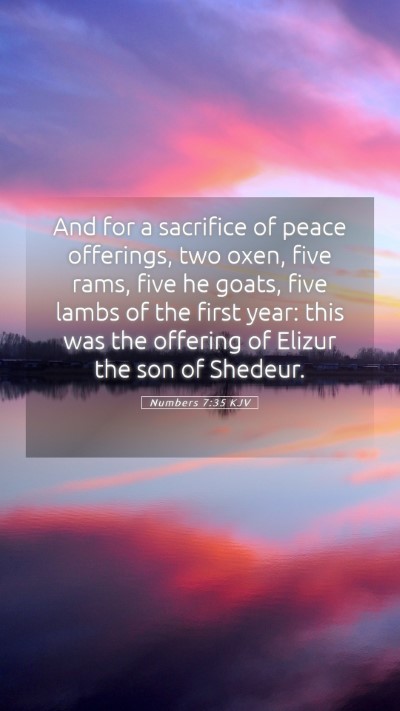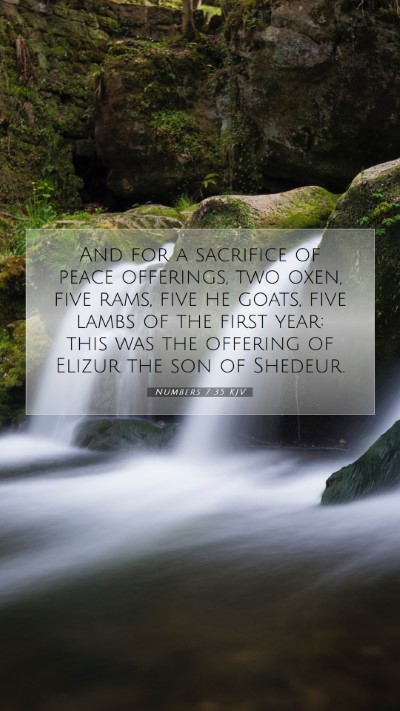Bible Verse Interpretation: Numbers 7:35
The verse Numbers 7:35 falls within a broader narrative concerning the offerings made by the leaders of Israel during the dedication of the altar. This scripture particularly emphasizes the participation of the tribe of Ephraim in this significant ritual, where each leader brought offerings to honor God and to seek His favor.
Contextual Overview
The Book of Numbers outlines the journey of the Israelites through the wilderness after their exodus from Egypt. The structure of the book includes various censuses, laws, and instructions concerning worship and the organization of the camp. Numbers 7 serves as a pivotal chapter detailing the contributions of the tribes during the dedication of the altar, symbolizing their commitment to God’s covenant.
Verse Breakdown
Numbers 7:35 (ESV): "On the tenth day of the seventh month, the leaders of the people of Ephraim came forward." This mention of timing is crucial as it aligns with specific Jewish feasts and is steeped in historical significance.
Significance of Timing
Understanding the timing reflects the Israelites’ adherence to the calendar established in the Law. The seventh month is particularly important, coinciding with the Feast of Tabernacles (Sukkot), which represents God’s provision and a season of harvest. Thus, locating the offerings within this context underscores the gratitude of the leaders as they celebrate God’s blessings.
Commentary Insights
- Matthew Henry: Henry emphasizes the communal aspect of the tribes' offerings. He notes that the leaders’ willingness to present gifts underscores the unity and collective devotion to Yahweh, signifying a communal identity as God’s chosen people.
- Albert Barnes: Barnes expands on the importance of the offerings as both a ceremonial act and a symbol of acknowledgment of God’s sovereignty. He points out that the offerings were meant to express gratitude and recognize God's providing hand in their journey.
- Adam Clarke: Clarke highlights the intricate details and symbolic significance of the quantities and types of offerings. He connects these rituals to principles of sacrifice and the expectation of divine favor, illustrating the theological implications of such acts.
Thematic Elements
From this verse, various themes emerge:
- Community and Collective Worship: The participation of Ephraim's leaders reflects the collective responsibility of the Israelites in worship and devotion to God.
- Historical Remembrance: Engaging in these acts serves as a reminder of their deliverance and journey, reinforcing their identity as God's chosen people.
- God’s Provision: The context of the offering during the harvest festival signifies acknowledgment of God’s blessings in providing for the needs of His people.
Application of the Verse
Numbers 7:35 challenges modern believers to consider:
- How do we acknowledge and express gratitude for God’s provisions in our lives?
- What does it mean to participate in communal worship and service?
- In what ways can the act of giving shape our understanding of stewardship as Christians?
Cross References
This verse connects with several other passages in the Bible that reinforce its themes:
- Exodus 25:2: God calls for offerings from the hearts of His people for the tabernacle, similar to the offerings presented in Numbers.
- Leviticus 23:33-43: Details the Feast of Tabernacles, providing context for the timing of the offerings in Numbers 7:35.
- 1 Chronicles 29:9: Describes the joy in giving and the unity of the people in their offerings to God.
Conclusion
Understanding Numbers 7:35 through the insights of public domain commentaries allows for a richer interpretation of the significance of communal offerings within the Biblical narrative. It reveals deep themes of gratitude, community, and remembrance in the life of God’s people. For those interested in Bible study resources, this verse serves as a profound example of how to interpret Bible verses and apply their meaning to daily life.


